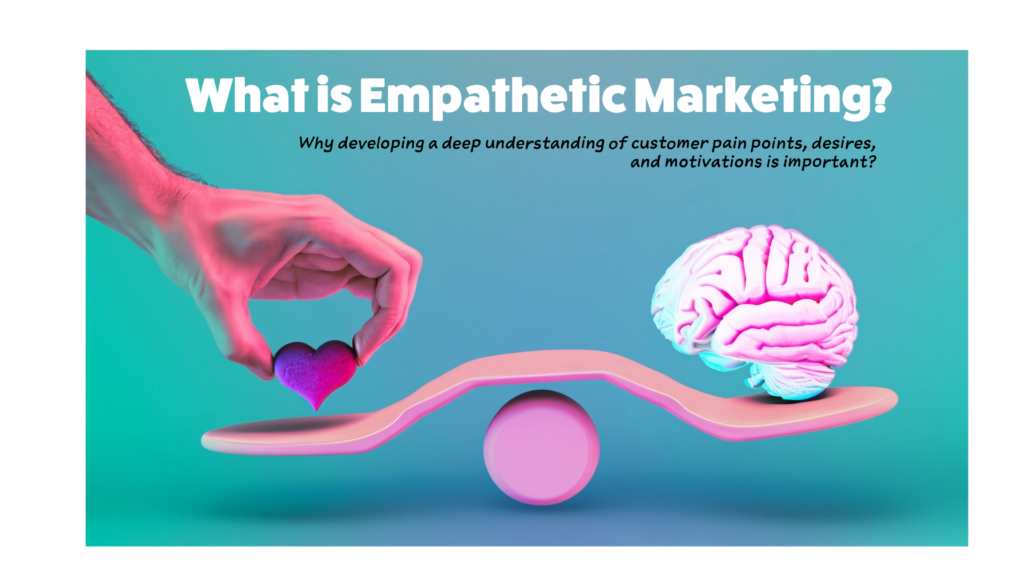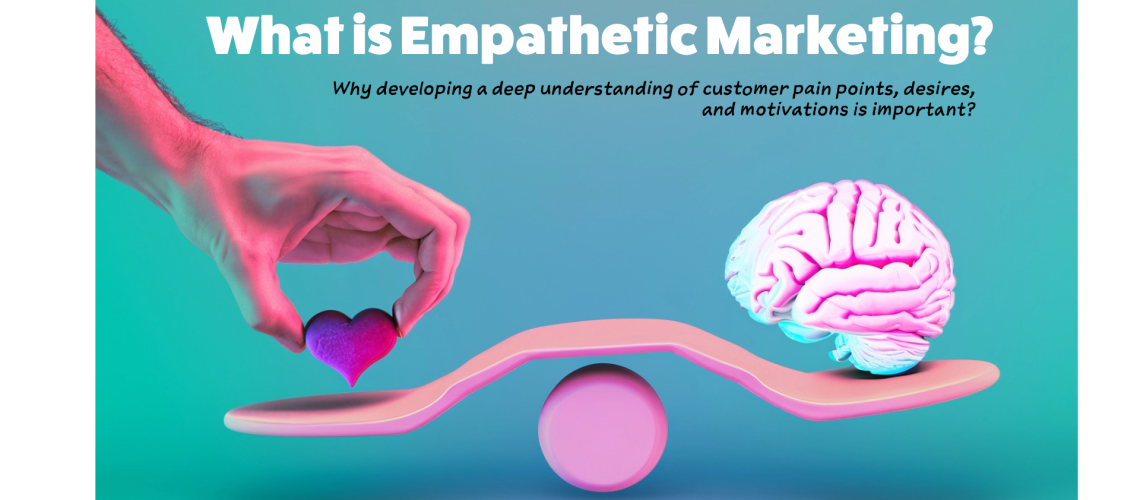Empathetic marketing, also known as compassionate marketing, is an approach that focuses on understanding and addressing the needs, emotions, and experiences of customers. It involves developing a deep understanding of customer pain points, desires, and motivations and using that understanding to create marketing campaigns and strategies that resonate with customers on an emotional level. Empathetic marketing aims to build trust, foster connections, and create long-term relationships with customers.
Here are some key aspects and strategies associated with empathetic marketing:
- Customer Understanding: Empathetic marketing begins with gaining a deep understanding of your target audience. This includes conducting market research, analyzing customer data, and using customer feedback to identify their needs, challenges, and aspirations.
- Persona Development: Creating buyer personas is a crucial step in empathetic marketing. Buyer personas are fictional representations of your ideal customers, based on demographic information, behavior patterns, motivations, and goals. They help humanize your target audience and guide your marketing efforts.
- Customer Journey Mapping: Mapping the customer journey involves visualizing the various touchpoints and interactions customers have with your brand throughout their buying process. Understanding their emotions, pain points, and expectations at each stage allows you to tailor your marketing messages and experiences accordingly.
- Storytelling: Empathetic marketing leverages storytelling to connect with customers on an emotional level. By sharing authentic and relatable stories, you can demonstrate empathy, inspire trust, and build a stronger connection with your audience.
- Personalization: Personalization is a key component of empathetic marketing. Tailoring your marketing messages, content, and offers to individual customer preferences and needs shows that you understand and care about their unique circumstances.
- Social Listening: Monitoring and engaging with customers on social media and other online platforms allows you to gather real-time feedback, address concerns, and demonstrate empathy. Social listening tools help you track conversations and sentiment around your brand and industry.
- Customer-Centric Content: Creating content that provides value and addresses customer pain points is a core aspect of empathetic marketing. Content should be educational, informative, and emotionally resonant, focusing on helping rather than selling.
- Authenticity and Transparency: Empathetic marketing requires authenticity and transparency. Being open, honest, and genuine in your communications builds trust and credibility with your audience.
- Cause Marketing: Aligning your brand with social or environmental causes that resonate with your target audience can be a powerful way to showcase empathy. Supporting and promoting causes that matter to your customers demonstrates shared values and a commitment to making a positive impact.
- Continuous Feedback and Improvement: Empathetic marketing is an ongoing process. Collecting and analyzing customer feedback, measuring campaign performance, and making adjustments based on insights and data are essential for refining your approach and staying connected to your audience.
Get free marketing consultation from Kashyap360’s expert mentors. Contact as at +91 7397455128 or godwin@kashyap360.com

Here are a few source links to explore further:
- “The Power of Empathy in Marketing” – Forbes:
https://www.forbes.com/sites/forbesagencycouncil/2020/07/30/the-power-of-empathy-in-marketing/?sh=4f74a7e946ed - “The Role of Empathy in Marketing” – Harvard Business Review:
https://hbr.org/2020/03/the-role-of-empathy-in-marketing - “Empathetic Marketing: How to Connect and Engage with Your Audience” – HubSpot:
https://blog.hubspot.com/marketing/empath
etic-marketing
- “How to Use Empathy in Your Marketing to Drive Business Results” – Sprout Social:
https://sproutsocial.com/insights/empathy-marketing/ - “Why Empathy is the Key to Being More Human in Marketing” – Content Marketing Institute:
https://contentmarketinginstitute.com/2020/09/empathy-human-marketing/
Remember to evaluate the credibility and relevance of each source when conducting further research.
Empathetic marketing is an approach that focuses on understanding and connecting with customers on an emotional level. It involves crafting marketing messages and strategies that resonate with the target audience’s feelings, values, and experiences. Empathetic marketing aims to create a sense of empathy and trust, ultimately fostering stronger relationships between brands and consumers. Here is some complete information about empathetic marketing:
- Understanding Empathetic Marketing:
- Article: “The Power of Empathetic Marketing” by Forbes: Link
- Article: “The Definitive Guide to Empathetic Marketing” by HubSpot: Link
- Benefits of Empathetic Marketing:
- Article: “The Business Benefits of Empathetic Marketing” by Salesforce: Link
- Article: “The ROI of Empathy in Marketing” by Inc.com: Link
- Strategies for Empathetic Marketing:
- Article: “7 Steps to Creating an Empathetic Content Marketing Strategy” by Content Marketing Institute: Link
- Article: “5 Ways to Create an Empathetic Marketing Strategy” by Entrepreneur: Link
- Case Studies and Examples:
- Article: “10 Examples of Empathy Marketing Done Right” by Marketing Dive: Link
- Article: “How Brands Are Using Empathy to Connect with Consumers During COVID-19” by Adweek: Link
- Empathy in Customer Experience:
- Article: “Why Empathy Is the Key to Improving Customer Experience” by Harvard Business Review: Link
- Article: “How to Use Empathy in Customer Service (with Examples)” by Help Scout: Link
These resources should provide you with a comprehensive understanding of empathetic marketing, its benefits, strategies, and real-world examples.




